In this modern era, many skills are needed for young adults to lead a good life. But most young adults lack effective communication skills, critical thinking and problem-solving skills, digital literacy skills, soft skills, and hard skills. These are the key skills young adults lack. However, there is nothing to be surprised about except trying to gain these skills.
Every year, millions of young people enter the job market around the world after completing their higher studies. One thing is heard again and again: why young people are not getting the expected jobs. Due to a lack of certain skills, they are not getting the desired jobs.
Under the circumstances, questions are being raised about the skills of young adults in the job market. While some of the young people get jobs by showing their skills, a large part do not get jobs due to a lack of various necessary skills.
Times are changing rapidly; our surroundings are changing based on computers and technology. People are also changing themselves. Young adults, in particular, are focusing on acquiring new skills or abilities. The United Nations estimates that at least 600 million new job opportunities will be created for young adults in the next 15 years, many of which we may not even be able to imagine now. And to encourage young people in that direction, the United Nations celebrates ‘World Youth Skills Day’ on July 15th every year.
Technology will open new doors for people to work, which people could not even think of before. This requires the necessary skills. In this write-up, I will highlight the skills that most young adults lack.
Table of Contents
Top High-Income Skills Young Adults Lack for Career Success
Today’s job market is tough for young adults seeking well-paid jobs. Even with good grades, many lack key skills like communication, digital know-how, and problem-solving that employers want. Learning these skills can open doors to high-paying jobs in tech, freelancing, and more. Without delay, let’s begin with what skills young adults lack.
1. Lack of Language Skills
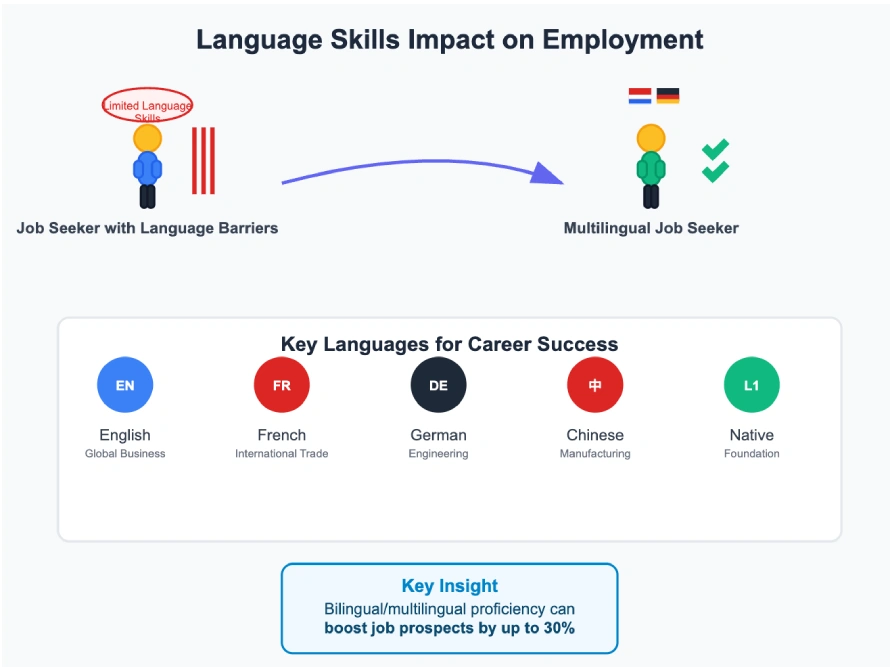
A job seeker may have passed with good results, but when the written exam is taken, it is seen that he or she is not able to write anything in English or his or her native language. For these reasons, young people do not get jobs. Young adults lack language skills, especially a lack of good command of the English language. English is needed everywhere in our lives now. Young people also lack skills in other languages. Language skill adds qualification to their CV and give them a head start in the job market. In addition to English, there are many languages, such as French, German, and Chinese, that need to be learned for career success.
Insight: Research shows bilingual or multilingual proficiency can boost job prospects by up to 30%, especially in global-facing roles.
2. Lack of Communication Skills
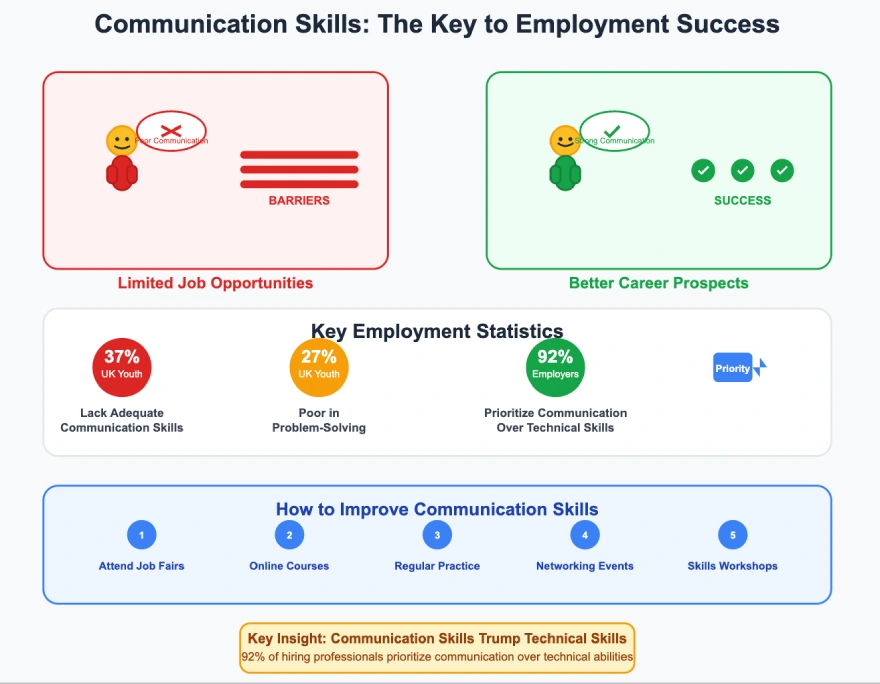
Nowadays, young adults want to do a lot of things and want to do good jobs, but Many of them do not have proper communication skills. Along with studying at school, college, or university, one should develop communication skills. You can improve your various skills by participating in job fairs at the university or different places around you. If you proceed in this way, it will be easier to get a job after completing your studies. That is why young people need to pay attention to this aspect. There are various courses online and offline to improve communication skills.
Employer Data: According to industry reports, 37% of UK youth aged 18–25 lack adequate communication skills, and 27% perform poorly in problem-solving. A LinkedIn survey shows that 92% of hiring professionals prioritize communication abilities over technical skills.
3. Lack of Training Skills
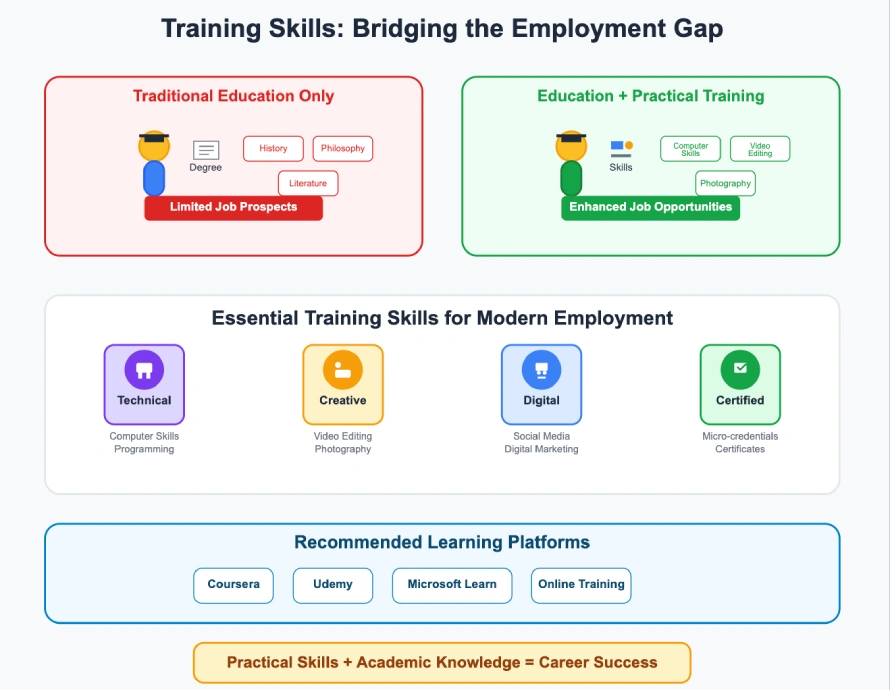
Most young adults lack training skills along with their degrees in general disciplines, as college or university education is not always useful for young adults. Young adults who study history or philosophy at the university do not become history critics or philosophers after completing their studies. Some get jobs after studying for a job, but a large part of them do not get jobs.
If these young people do short‑term training courses on computer skills, video editing, photography, and various other subjects along with their studies, then they can get jobs after completing their studies by showing these skills. These skills will put them ahead of the other ten.
Resource: Platforms like Coursera, Udemy, and Microsoft Learn provide micro‑credentials that employers increasingly value.
4. Lack of Special Skill
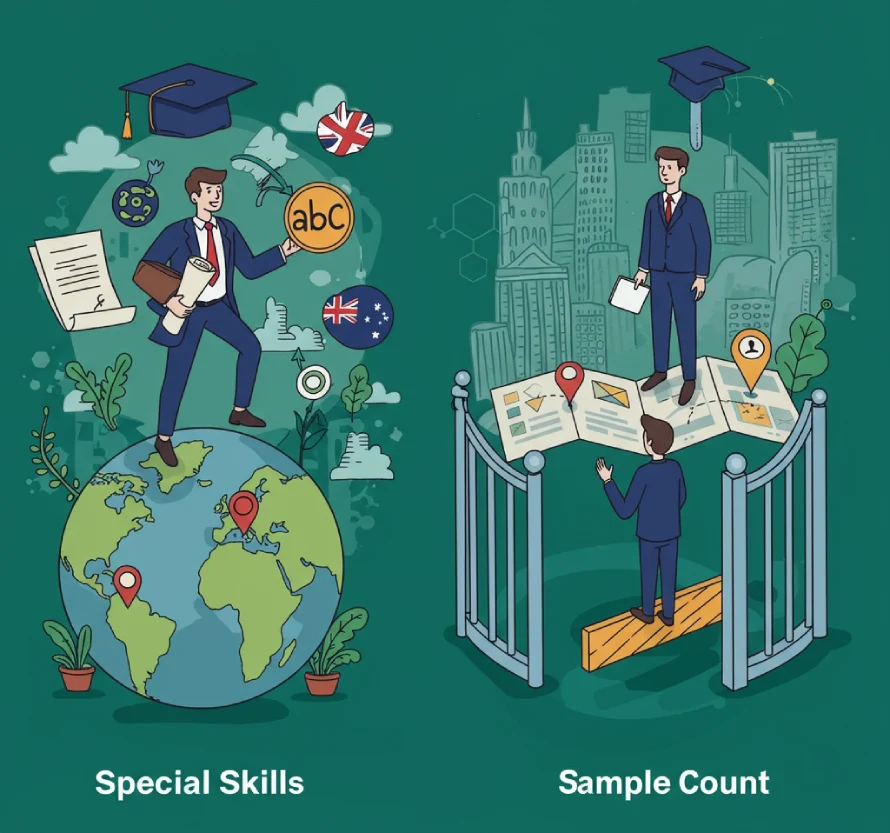
If young adults educate themselves in technical education and do a diploma course, as well as English skills, such as IELTS, and score a good score, then they can easily get good jobs abroad. They can even get citizenship in another country with these jobs. At the time when he moves forward with these educations, another one of his friends may not get a job at all.
Insight: Countries such as Canada and Australia prioritize candidates with technical diplomas and English proficiency in their skilled migration programs.
5. Lack of Innovative Skills
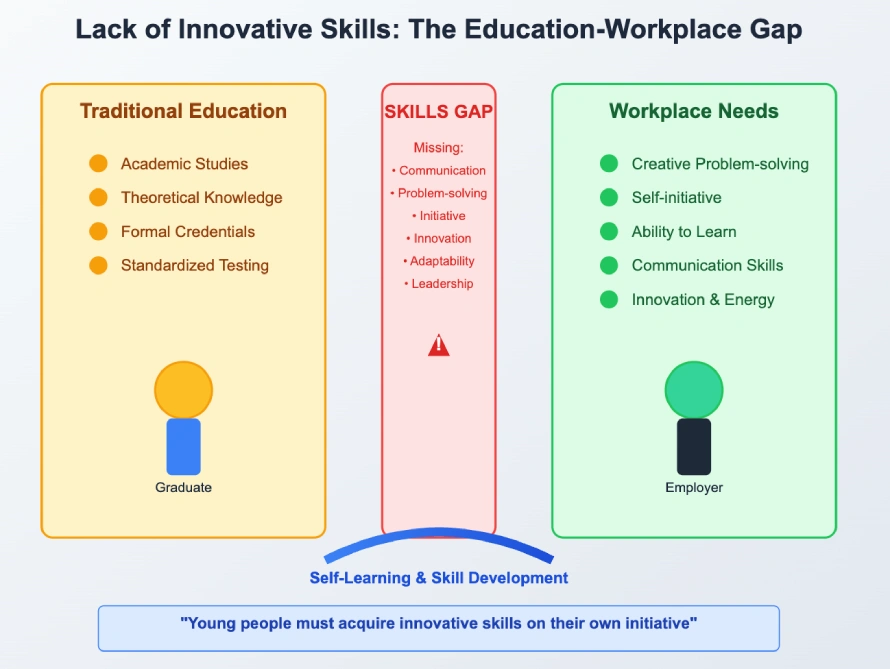
Most young adults do not have innovative skills. The college or university teaches young people academic studies, but it does not teach how to apply for a job or how to acquire certain skills that will make it easier for young people to get a job. Therefore, along with studies, young people have to acquire skills in various subjects on their own initiative.
They are seeing a lack of various skills among job applicants. They are seeing a lack of good speaking and writing skills. They want energetic and smart young people, young people who do not have to be told to work. They want to give jobs to young people who will work on their own initiative and with innovative skills.
Trend: Employers now prioritize “ability to learn” and creative problem‑solving more than formal credentials
6. Lack of Software Skills
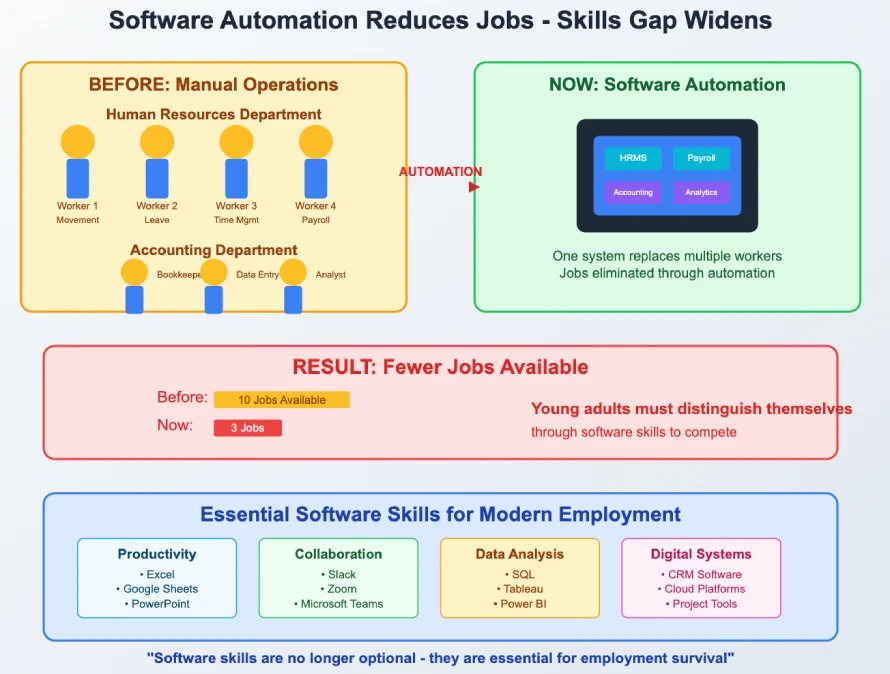
A lack of software skills is found among most young adults around the world. In this case, it should be kept in mind that the job market will be more difficult in the future, as a lot of software has been developed today, which has reduced the work of people. Earlier, separate workers were appointed in the human resources department to take care of the movement of office workers, taking leave, and time management. But now, through software, this work can be done on computers.
Many works in the accounting department are being done on software. Thus, the number of workers in the job market is decreasing. Therefore, to get a job in the coming days, young people will have to be such that they distinguish themselves from others.
Note: Employers expect familiarity with productivity tools (Excel, Sheets) and collaboration platforms (Slack, Zoom), plus basic data tools like SQL or Tableau.
7. Lack of Soft Skills
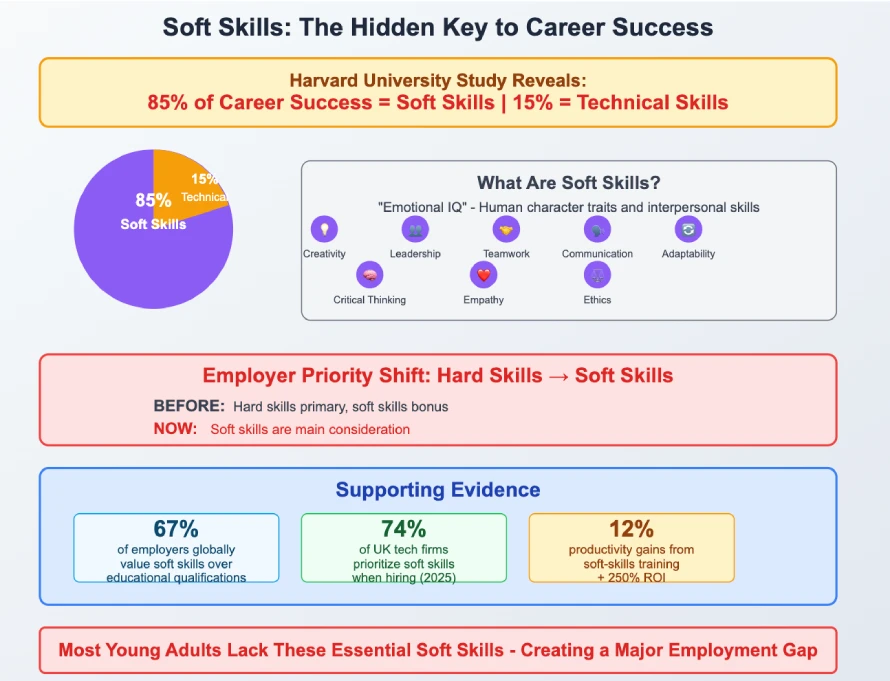
Most young adults do not have soft skills. Soft skills are based on personal emotions, feelings, and intelligence. Such as creativity, leadership qualities, teamwork, problem‑solving ability, etc. It is seen that companies face the most difficulty in finding applicants with the necessary skills after advertising a job. They now mainly want to see whether candidates are skilled in soft skills or not. A study published in the Harvard Business Review said the same thing. According to another study by Harvard University, 85 percent of career success comes from soft skills, and the remaining 15 percent comes from technical skills and knowledge.
Soft skills are human character traits and interpersonal skills. Some specific examples of soft skills are critical thinking skills, creativity, adaptability, ethics, communication, teamwork, cooperation, empathy, etc. For this reason, sociologists see soft skills as ‘emotional IQ.’
Earlier, employers used to look at whether candidates had hard skills or not. That was the main consideration. And if there were some soft skills along with it, that was a bonus. But now soft skills are becoming as important as hard skills. Or, in some cases, soft skills are becoming the main consideration. Employers in various fields are now leaning more towards soft skills than hard skills. So, young adults must become proficient in soft skills. Because even if they get a job somehow, employers can and will measure their soft skills during the job. Then their success will depend on these soft skills.
Supporting Evidence: Over two-thirds of employers globally value soft skills more than educational qualifications. In the UK, 74% of tech firms prioritize soft skills when hiring in 2025. Research indicates soft-skills training yields approximately 12% productivity gains and a 250% ROI.
8. Lack of Hard Skills
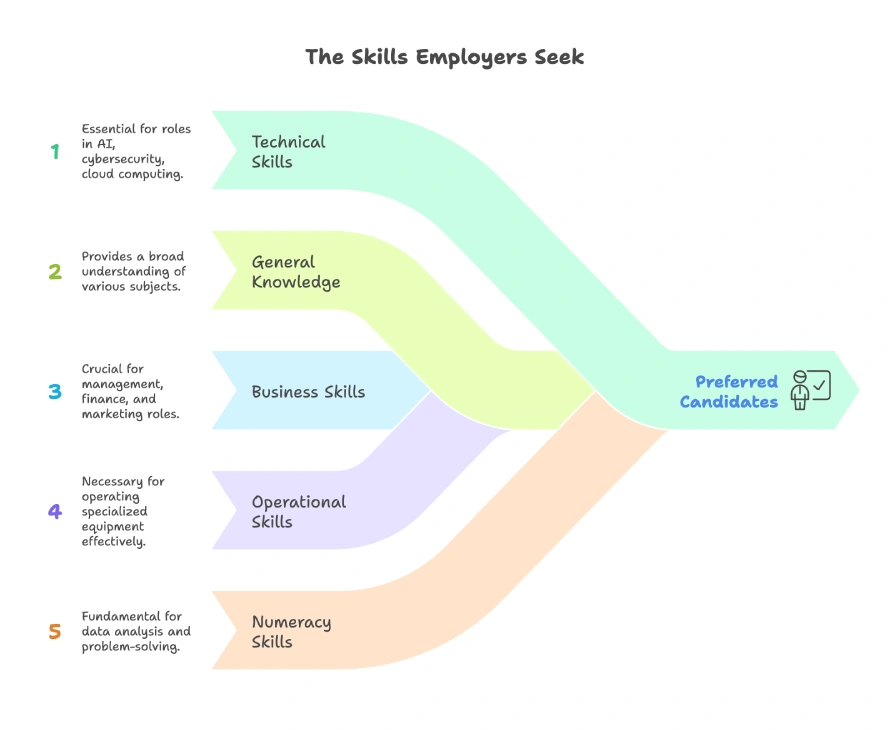
Hard skills are mainly subject‑based technical skills targeting specific jobs. Such as computers, general knowledge, language learning, etc. Hard skills means knowledge in science, technology, and technical abilities. It includes subject‑specific technical knowledge, general knowledge and awareness about current affairs, numeracy and mathematical skills, operational skills such as the ability to operate specialised equipment, and business skills such as finance, accounting, management, marketing, etc.
Observation: For roles in AI, cybersecurity, cloud computing, and data analysis, employers now prefer candidates with demonstrable skills, even over university degrees.
9. Lack of Problem-Solving Skill
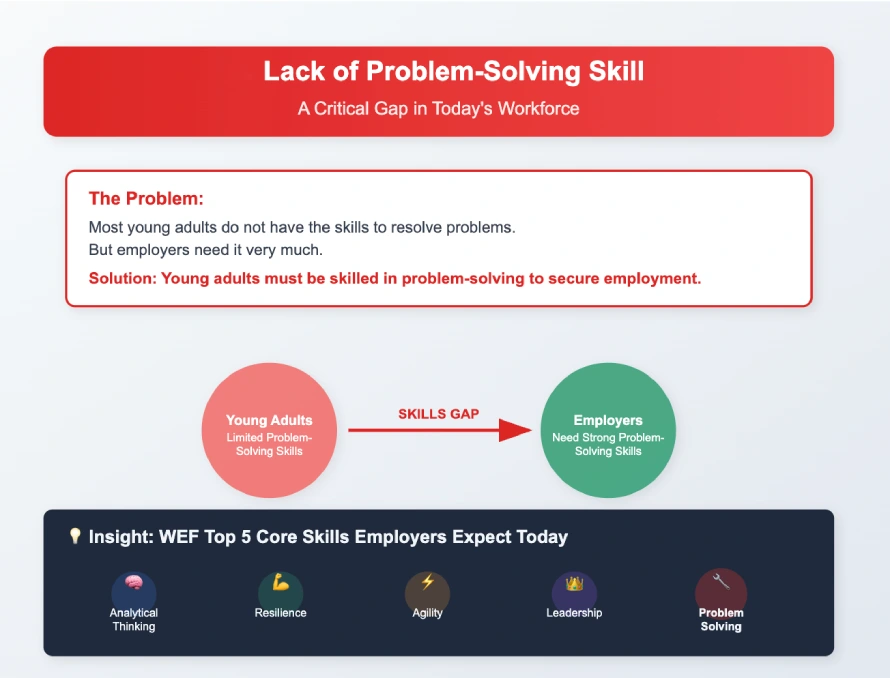
Most young adults do not have the skills to resolve problems. But employers need it very much. So, young adults must be skilled in solving problems in such a way that employers will give them jobs.
Insight: According to WEF, analytical thinking, resilience, agility, and leadership rank among the top five core skills employers expect today.
10. Lack of CV Writing Skill
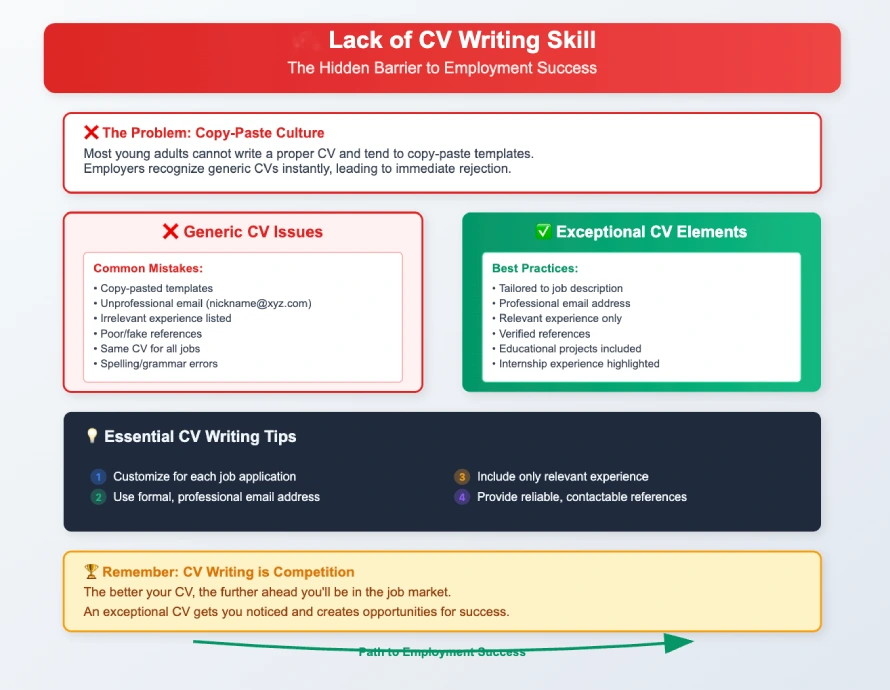
Most young adults cannot write a proper curriculum vitae (CV). An innate tendency has been seen among young people, which is that they copy and paste their CVs. Employers understand such common CVs as soon as they see them. That is why they do not get job offers. To get noticed by employers, one has to give an exceptional CV.
Apart from this, it is often seen that the e‑mail address used by job seekers may be their nicknames or code names. Seeing these, employers get a negative impression of the job seeker, which can create problems in getting a job. For this, one should give an email address using a formal name. So, they need to send a CV following the job advertisement. The young adults must keep one thing in mind: that the same CV can never be given to all jobs. It is best to give a CV in accordance with the job advertisement. Basically, you should submit your CV based on the job description.
In many cases, new candidates make a common mistake. That is, they include information that is not needed in their resume. It is not right to write experiences that are not needed or relevant. It is wise to mention only those experiences that are suitable for the job for which they are applying. Apart from this, references are an important thing in a resume. Many people give references who, when called or contacted, do not know the applicant. In this case, employers lose interest in that candidate. Employers lose confidence in the candidate due to small mistakes in the resume.
New job seekers will usually mention their basic information in their CV. If they have any work experience related to the job they are applying for, they will mention it. Apart from this, they can mention if they have done any projects in their educational career. They can mention their internship experience. Many times, having an internship in a good organisation creates good job opportunities. It should be remembered that writing a CV is also a big competition for getting a job. The better the CV, the further ahead he will be in the job market competition.
11. Lack of Digital Literacy Skills
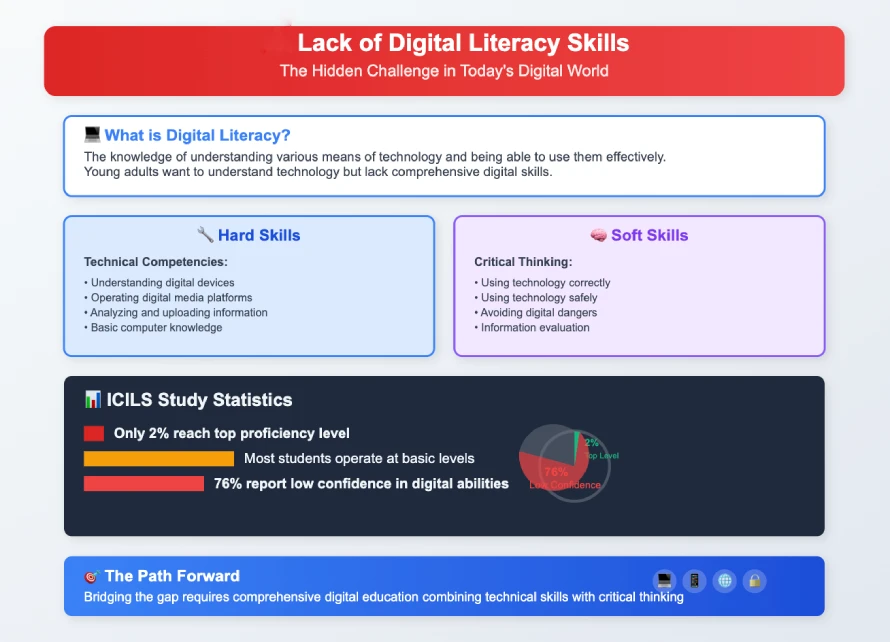
Young adults lack skills in digital literacy. Digital literacy means the knowledge of understanding various means of technology and being able to use them. The acquisition of knowledge is the first choice of today’s youth. So, they want to understand the language of technology in any way. At the same time, staying updated with new technologies is also the goal. To achieve that goal, they also find various courses online and offline.
However, this digital literacy skill is a combination of hard and soft skills. On the one hand, understanding digital devices and digital media so that information can be analysed and uploaded online using them correctly. On the other hand, finding ways to use technology correctly and safely, avoiding dangers. Digital literacy skills require basic computer knowledge.
Statistic: The ICILS study found that only about 2% of students globally reach the top proficiency level in digital literacy; most operate at basic levels. Additionally, around 76% of young people report low confidence in their digital abilities.
12. Lack of Freelancing Skills
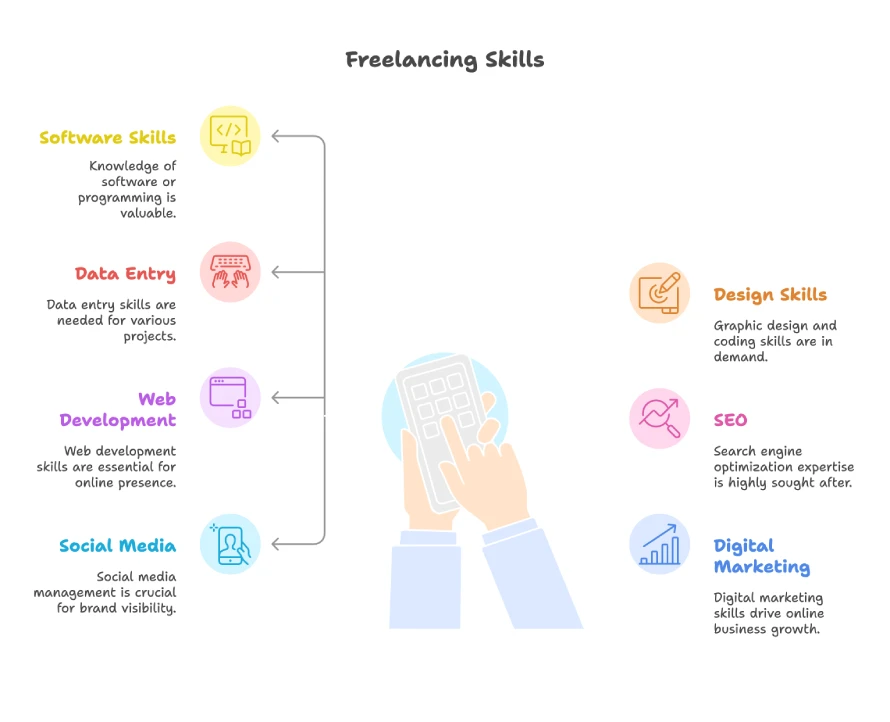
Everyone is interested in freelancing, but most people are still not 100% sure what it really is, how it works, and how to get involved in it. It has basically broken the concept of a traditional job. Because it does not always require an office, there are no fixed working hours; sometimes, short-term freelancing can be done from home.
Although this idea has been around the world for a long time, digital media has opened up a new world of freelancing. In this case, freelancing has become a much more technology-dependent job.
If you know software or programming or are skilled in graphic design or coding, you can find work on various websites yourself. In addition, there is a demand for data entry, SEO, web development, digital marketing, social media management, etc.
13. Lack of Entrepreneurial Skills
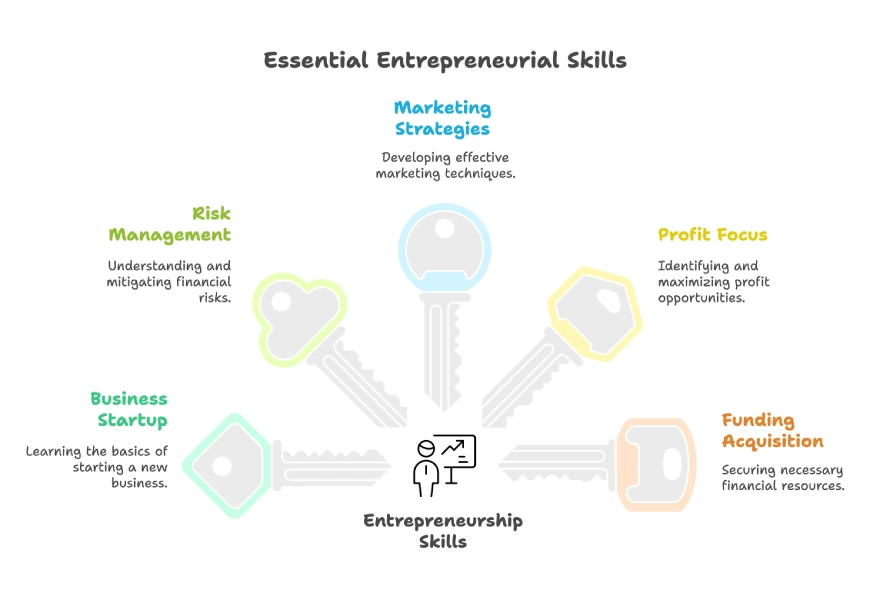
Entrepreneurship means starting a new business with financial risk. Many young adults lack this skill. Young people need to present their ideas or innovative products to everyone. However, for this reason, they should focus on acquiring skills. They need to learn how to start a new business, what the risks are, how to do marketing, where to focus on making a profit, and how to get funds. These are all things they need to learn.
Conclusion
Finally, times are changing. Technology is constantly changing, and demands are changing. So even after learning technical skills, the youth have to learn some basic things. The young adults have to increase their skills in proper language, communication, presentation, and negotiation.
The lack of necessary skills is more responsible than the lack of money. Many employers said that there is a huge shortage of qualified youth in the market. There is a huge gap between demand and supply. There is a shortage of skilled personal assistants in the office or corporate world.
In addition, emphasis has been placed on acquiring soft skills or interpersonal skills. These are information technology, communication, problem-solving skills, etc. Analysts believe that employers will want to see these qualities in young adults in the coming days. So, most young adults need to overcome the lacking to start a better career and lead a successful life.